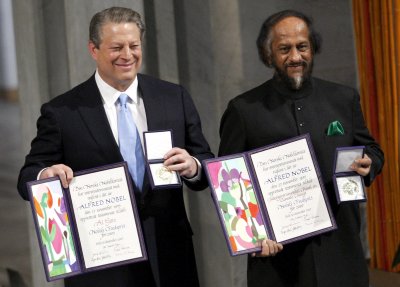 Head of United Nation's top climate panel R K Pachauri on Monday warned the international community that continued negligence in protecting the world's heritage and natural resources could prove extremely harmful for the human race and lead to some irreversible impacts on bio-diversity.
Head of United Nation's top climate panel R K Pachauri on Monday warned the international community that continued negligence in protecting the world's heritage and natural resources could prove extremely harmful for the human race and lead to some irreversible impacts on bio-diversity.
"Neglect in protecting our heritage of natural resources could prove extremely harmful for the human race and for all species that share common space on planet earth," Pachauri, the Chairman of the Intergovernmental Panel on Climate Change, said in his speech after receiving the prestigious Nobel Peace prize on behalf of the panel, along with former United States vice president Al Gore from Sweden's King Carl XVI Gustaf.
"This award being given to the IPCC, we believe, goes fundamentally beyond a concern for the impacts of climate change on peace. Honouring the IPCC through the grant of the
Nobel Peace Prize in 2007 in essence can be seen as a clarion call for the protection of the earth as it faces the widespread impacts of climate change," he said.
"There are many lessons in human history which provide adequate warning about the chaos and destruction that could take place if we remain guilty of myopic indifference to the progressive erosion and decline of nature's resources," Pachauri, Chairman of New Delhi-based Tata Energy Research Institute, said.
Also Read: The Rediff Interview: Dr Rajendra Kumar Pachauri
In general, the impacts of climate change on some of the poorest and the most vulnerable communities in the world could prove extremely unsettling, he said.
Climate change is expected to exacerbate current stresses on water resources. On a regional scale, mountain snowpack, glaciers, and small ice caps play a crucial role in fresh water availability, he said.
Pachauri said that the IPCC, established in 1988, has not provided any directions on how conflicts inherent in the social implications of the impacts of climate change could be avoided or contained.
Nevertheless, the Fourth Assessment Report provides scientific findings that other scholars can study and arrive at some conclusions on in relation to peace and security.
"Several parts of our reports have much information and knowledge that would be of considerable value for individual researchers and think tanks dealing with security issues as well as governments that necessarily are concerned with some of these matters," he said.
It would be particularly relevant to conduct in-depth analysis of risks to security among the most vulnerable sectors and communities impacted by climate change across the globe, he said.
Noting that in recent years several groups have studied the link between climate and security, Pachauri said that these have raised the threat of dramatic population migration, conflict, and war over water and other resources as well as a realignment of power among nations.
"Some also highlight the possibility of rising tensions between rich and poor nations, health problems caused particularly by water shortages, and crop failures as well as concerns over nuclear proliferation," he said.
Image: Former US vice president Al Gore and IPCC Chairman Dr Rajendra Pachauri with the Nobel medal and diploma during the award ceremony at Oslo Town Hall on Monday.
Photograph: Daniel Sannum Lauten/AFP/Getty Images
Also Read: Nobel Prize for IPCC's Pachauri





